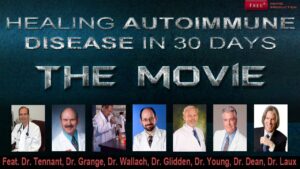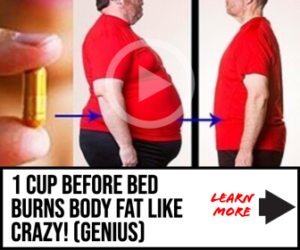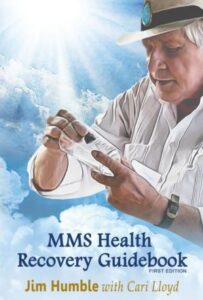FDA Adds Heart Inflammation Warning to Pfizer, Moderna COVID Vaccines as Some Experts Call for Full Approval
The U.S. Food and Drug Administration added a warning to fact sheets — as advised by the CDC’s Advisory Committee on Immunization Practices — for Pfizer and Moderna COVID vaccines indicating an increased risk of myocarditis and pericarditis following vaccination. FDA Adds Heart Inflammation Warning to Pfizer Moderna
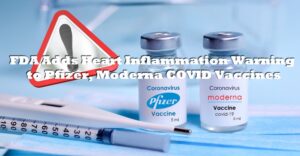 The U.S. Food and Drug Administration (FDA) on June 25 added a warning to patient and provider fact sheets for Pfizer and Moderna COVID vaccines indicating an increased risk of myocarditis and pericarditis following vaccination.
The U.S. Food and Drug Administration (FDA) on June 25 added a warning to patient and provider fact sheets for Pfizer and Moderna COVID vaccines indicating an increased risk of myocarditis and pericarditis following vaccination.
The warning notes reports of adverse events suggest increased risks of myocarditis and pericarditis, particularly following the second dose and with onset of symptoms within a few days after vaccination.
Myocarditis is inflammation of the heart muscle that can lead to cardiac arrhythmia and death. According to researchers at the National Organization for Rare Disorders, myocarditis can result from infections, but “more commonly the myocarditis is a result of the body’s immune reaction to the initial heart damage.” FDA Adds Heart Inflammation Warning to Pfizer Moderna
Pericarditis is often used interchangeably with myocarditis and refers to inflammation of the pericardium, the thin sac surrounding the heart.
The FDA’s update followed a review of information and discussion by the Centers for Disease Control and Prevention’s (CDC) Advisory Committee on Immunization Practices (ACIP) meeting on June 23 where the committee acknowledged 1,200 cases of heart inflammation in 16- to 24-year-olds and said mRNA COVID vaccines should carry a warning statement.
“The data presented at this meeting reinforced the FDA’s decision to revise the fact sheets and further informed the specific revisions,” the FDA said in a statement.
Health officials said the benefits of receiving a COVID vaccine still outweigh any risks. Physicians and other public commenters accused the CDC during the meeting of exaggerating the risk to young people of COVID, and minimizing the risk of the vaccines.
Dr. Meryl Nass, an internal medicine physician, pointed out several flaws in the data used during the ACIP’s presentation: “As of now, two major ways the rate of myocarditis were minimized [during the presentation] was to lump people from age 39 and down — even though the highest rates [of myocarditis] are in the youngest kids. This waters down the rate. The other method was to only include a very narrow window of time after vaccinations started in the 12-15 age group, thus omitting the vast majority of second doses, which is when about 75% or more of the myocarditis cases occur. Also, the genders were sometimes mixed. And rates in girls are much lower than boys.”
During the CDC’s presentation, Dr. Megan Wallance stated the overall efficacy of Pfizer’s COVID vaccine in the 12 to 15 age group is 100% and Moderna’s was comparable. Wallace then did a risk/benefit analysis comparing myocarditis cases versus hospitalization rates for COVID in people between the ages of 12 and 29.
19-Year-Old College Freshman Dies From Heart Problem One Month After Second Dose of Moderna Vaccine
 Simone Scott underwent a heart transplant one month after developing what her doctors believe was myocarditis following her second dose of Moderna. She received the second vaccine May 1st and died June 11th
Simone Scott underwent a heart transplant one month after developing what her doctors believe was myocarditis following her second dose of Moderna. She received the second vaccine May 1st and died June 11th
Simone Scott, a 19-year-old freshman at Northwestern University in Evanston, Ill., died June 11 of complications from a heart transplant she underwent after developing what her doctors believe was myocarditis following her second dose of the Moderna COVID vaccine.
Scott received her second dose of Moderna on May 1, WLWT 5 reported. When the 2020 Mason High School graduate and senior class vice president paid a surprise visit to her parents for Mother’s Day, May 9, her mother said she noticed Scott wasn’t feeling well.
“I did notice she was kind of stuffy so her voice wasn’t exactly the same,” Valerie Kraimer said.
Scott returned to campus on May 11, where even after a visit to the doctor, her condition worsened. Kraimer said multiple tests came back negative including a COVID-19 test.
“On Sunday morning [May 16], she texted her father and said, ‘Dad, I feel so dizzy. I cannot get out of bed’ and that’s when everything really started from there,” Kraimer said.
Scott’s parents were hundreds of miles away so her father called campus police to have someone check in on her.
“We learned that a doctor had to jump on her chest and give her CPR because she was that bad, and then the whole cascade of events happened, Kraimer said. “They had to intubate her and realized she was in heart failure.”
After multiple interventions, including hooking Scott to an ECMO machine that mirrors the function of the heart so her own heart could rest, doctors determined she needed a heart replacement. Her doctors have not fully confirmed the cause of her death, but they said it appears Scott suffered from myocarditis.
Myocarditis is inflammation of the heart muscle that can lead to cardiac arrhythmia and death. According to researchers at the National Organization for Rare Disorders, myocarditis can result from infections, but “more commonly the myocarditis is a result of the body’s immune reaction to the initial heart damage.” FDA Adds Heart Inflammation Warning to Pfizer Moderna
The university told students Scott died from complications after undergoing a heart transplant. “Scott’s death came weeks after a heart complication in May, which led to a heart transplant,” The Daily Northwestern reported.
Former New York Times reporter Alex Berenson said in a thread posted June 14, the Northwestern journalism student “suffered a case of apparent myocarditis-induced heart failure on Sunday, May 16. Despite extraordinary measures to save her, including a heart transplant, she died Friday morning at Northwestern Memorial Hospital in Chicago.”
“Doctors appear to have repeatedly missed signals as Scott’s condition worsened in the two weeks following her second shot — before she abruptly crashed,” Berenson said.
Scott received the COVID vaccine on her own accord, but her university now mandates students be fully vaccinated before returning to campus, The College Fix reported.
“I still feel like she’s here, even though I know that she’s not and it just feels like such a waste,” Kraimer said.
Scott’s parents are still waiting on multiple tests on her heart to come back in the hope they will learn why they lost their daughter so suddenly.
As The Defender reported June 11, the Centers for Disease Control and Prevention (CDC) will convene an emergency meeting of its advisers on June 18 to discuss higher-than-expected reports of heart inflammation following doses of Pfizer and Moderna COVID vaccines.
The CDC said during a June 10 meeting of the U.S. Food and Drug Administration’s (FDA) Vaccines and Related Biological Products Advisory Committee the agency had identified 226 reports of heart inflammation that might meet its “working case definition” of myocarditis and pericarditis following the shots, The Defender reported last week.
According to the CDC, a total of 475 cases of myocarditis or pericarditis were recorded in patients 30 and younger who received an mRNA vaccine. The median age of people with myocarditis or pericarditis following the first dose was 30, and after the second-dose, 24.
The CDC’s Vaccine Adverse Events Reporting System (VAERS) revealed 900 cases of myocarditis and pericarditis, among all age groups reported in the U.S following COVID vaccination between Dec.14, 2020 and June 4, 2021. Of the 900 cases reported, 533 cases were attributed to Pfizer, 331 cases to Moderna and 32 cases to J&J’s COVID vaccine.
Dr. Tom Shimabukuro, deputy director of the CDC’s Immunization Safety Office said during the June 10 FDA hearing there had been a higher-than-expected number of cases of heart inflammation among young people recently vaccinated with their second doses of mRNA vaccine. By
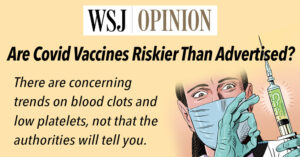 Kudos to the editors of the Wall Street Journal, which on Tuesday published an op-ed by two physicians who said politics — not science — is behind the failure of health officials and the media to fully inform the public about the potential risks associated with COVID vaccines.
Kudos to the editors of the Wall Street Journal, which on Tuesday published an op-ed by two physicians who said politics — not science — is behind the failure of health officials and the media to fully inform the public about the potential risks associated with COVID vaccines.
In “Are Covid Vaccines Riskier Than Advertised?,” Joseph A. Ladapo, M.D., Ph.D., associate professor of medicine at the David Geffen School of Medicine, and Harvey A. Risch, M.D., Ph.D., professor of epidemiology at Yale School of Public Health wrote while “some scientists have raised concerns that the safety risks of Covid-19 vaccines have been underestimated … the politics of vaccination has relegated their concerns to the outskirts of scientific thinking.” Full Read Link
No vaccine mandates for children and young adults!
Tell schools and universities in your state why it’s a bad idea to give COVID-19 vaccines to children.
Schools and universities are considering mandates now. Today, the CDC’s Advisory Committee on Immunization Practices (ACIP) said that there is ‘likely’ a link between heart inflammation and Pfizer, Moderna COVID vaccines. During the meeting, the committee members acknowledged 1,200 cases of heart inflammation in 16- to 24-year-olds, and said mRNA COVID vaccines should carry a warning statement. Overall, the officials emphasized that the benefits of COVID vaccines outweigh the risks. Physicians and other public commenters strongly disagreed accusing the CDC of exaggerating the risk to young people of COVID, and minimizing the risk of the COVID vaccines.
FEEL FREE TO USE OUR MATERIALS
CHD has two letters already written—a short version and a longer version—that you are free to copy or use components of to make this as quick and easy as possible. (Additionally, our Mandates Took Kit includes a wealth of information and resources to assist you in opposing vaccine mandates that are likely being considered in your state’s legislature.) FDA Adds Heart Inflammation Warning to Pfizer Moderna
What we know now about COVID-19 and children:
- Almost 100% of kids don’t suffer from severe COVID. In fact, many have no symptoms at all. Thus, they may have already had COVID which is another excellent reason not to get the vaccine.
- The World Health Organization (WHO) has announced that young people should not take the vaccine.
- A concerning number of young people, especially those under 30, are suffering from myocarditis (heart inflammation), blood clots, low platelets and more following COVID-19 vaccination.
- The risks of COVID-19 vaccination adverse outcomes certainly outweigh the benefits to children and young adults who are considered low risk populations.
- Parental rights to make independent, informed decisions regarding their children’s medical interventions, including vaccines, are being threatened.
- Some scientists have raised concerns that the safety risk of COVID-19 vaccinations have been underestimated. As of June 11, there have been 352,386 adverse events including 5,993 deaths following COVID-19 vaccination.
- Clinical trials in children and young adults are ongoing and will not be completed for at least one year.
- Not a single published study has demonstrated that patients who have had a prior COVID-19 infection benefit from the vaccination. So why recommend all kids get the shot?

